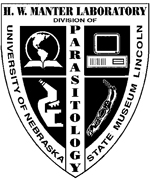Parasitology, Harold W. Manter Laboratory of

Harold W. Manter Laboratory of Parasitology: Library Materials
ORCID IDs
Escalante 0000-0002-1532-3430
Document Type
Article
Date of this Version
11-6-2017
Citation
Molecular and Biological Evolution (2017) 35(2):383–403
doi: 10.1093/molbev/msx285
Abstract
Haemosporidians are a diverse group of vector-borne parasitic protozoa that includes the agents of human malaria; however, most of the described species are found in birds and reptiles. Although our understanding of these parasites’ diversity has expanded by analyses of their mitochondrial genes, there is limited information on these genes’ evolutionary rates. Here, 114 mitochondrial genomes (mtDNA) were studied from species belonging to four genera: Leucocytozoon, Haemoproteus, Hepatocystis, and Plasmodium. Contrary to previous assertions, the mtDNA is phylogenetically informative. The inferred phylogeny showed that, like the genus Plasmodium, the Leucocytozoon and Haemoproteus genera are not monophyletic groups. Although sensitive to the assumptions of the molecular dating method used, the estimated times indicate that the diversification of the avian haemosporidian subgenera/genera took place after the Cretaceous–Paleogene boundary following the radiation of modern birds. Furthermore, parasite clade differences in mtDNA substitution rates and strength of negative selection were detected. These differences may affect the biological interpretation of mtDNA gene lineages used as a proxy to species in ecological and parasitological investigations. Given that the mitochondria are critically important in the parasite life cycle stages that take place in the vector and that the transmission of parasites belonging to particular clades has been linked to specific insect families/subfamilies, this study suggests that differences in vectors have affected the mode of evolution of haemosporidian mtDNA genes. The observed patterns also suggest that the radiation of haemosporidian parasites may be the result of community-level evolutionary processes between their vertebrate and invertebrate hosts.


Comments
Open access.